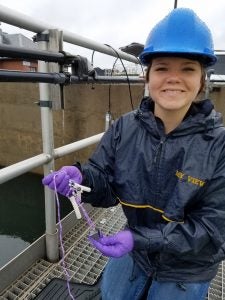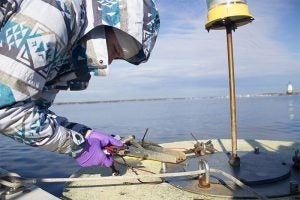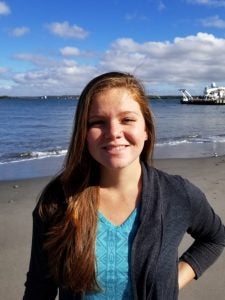May 20, 2020
Welcome to the sixth in our new series: GSO Profiles! Each post will feature a brief interview with a member of the GSO community. Our first several profiles will be of GSO students who graduated over the past year. These profiles are one way we can celebrate the accomplishments of those graduating in this unusual time of COVID-19, and also welcome them to the ranks of GSO alumni.
We are continuing our series with Christine L. Gardiner who finished her M.S. in Oceanography with a concentration in chemical oceanography in 2019. Her advisor was GSO Professor Rainer Lohmann. Deep in the heart of Texas, she heard about URI’s marine sciences program and soon found herself carrying out research on Narragansett Bay and loving it (even in the cold of winter). Read about the research, the people, and the places that inspire her.
Here’s Christine, in her own words:

GSOP: Tell us about your work/research at GSO: what question(s) are you trying to answer?
CLG: My research focused on studying chemical pollutants in Narragansett Bay and wastewater treatment plants. In order to do this, I used “passive samplers,” which are monitoring tools that remain in the water over a certain time and detect pollutants in the environment. I was studying per- and polyfluoroalkyl substances (PFAS) specifically—how they enter the bay (wastewater), how abundant they are throughout the bay, and how they exit the bay (through sedimentation and mixing with the Atlantic Ocean water). Understanding how pollutants move throughout the environment is really important in order to help set regulatory standards for drinking water limits, industry discharge limits and fish consumption advisories.

GSOP: What is your favorite thing about your work?
CLG: My favorite part was the field work. I studied nine sites throughout the bay that I regularly collected water and sediment samples at and deployed my passive samplers. Being on the water, even in the dead of winter, was so relaxing. I got to know Narragansett Bay really well, and the hands-on work made me really appreciate how my research can benefit the environment.
GSOP: What led you to your studies/career in ocean science?
CLG: I grew up on the coast and have always loved the ocean. From early childhood I knew I wanted to study ocean sciences. I went to every aquarium, sailing and scuba camp you could imagine. I found the water and all the mysterious creatures that lived in it fascinating and always wanted to learn more.
GSOP: What brought you to GSO?
CLG: I came to URI as an undergraduate studying marine biology. Growing up in Houston, Texas I wanted a change of scenery and came to URI for their strong ocean sciences program, which I greatly enjoyed with all their field and hands-on research opportunities. For my senior honors project I worked with Lohmann studying the bioaccumulation of halogenated natural products in Narragansett Bay. He offered me the opportunity to stay on at GSO as a master’s student, which I jumped at and was able to continue my research in Narragansett Bay.
GSOP: How have the COVID precautions affected you?
CLG: My research was not impacted much by the COVID precautions. I finished my field and laboratory research last fall, so this spring I have been working on data analysis and writing up my master’s thesis to be published in a scientific journal. Being able to work from home, distraction free, has actually been really helpful.
GSOP: Who have been your role models or mentors?
CLG: My main role model and mentor has been my lab mate Anna Robuck, a Ph.D. student also working with Lohmann. When I first joined the Lohmann lab, she took me under her wing and showed me the ropes of environmental chemistry. She is truly inspiring. On top of her GSO work, she is a NOAA scholar and student scientist at the EPA. Her hard work, intellect, and multitasking is really impressive, and she has taught me so much throughout my time at GSO.
GSOP: What do you do for fun?
CLG: I love all things outdoors. Camping, hiking, skiing, surfing, beach-going, kayaking, you name it. I also really enjoy macramé and make decorative wall-hangings for friends and family.
GSOP: What is your favorite spot or view at GSO?
CLG: It has to be the library. You can’t beat that view with the wall full of windows overlooking the bay. Also, the stacks of books, articles, and dissertations by previous students is really inspiring to keep on learning and adding to the collective knowledge of GSO.
GSOP: What have you been up to since you graduated?
CLG: I’m currently job hunting. With everything going on with the COVID pandemic, it’s been a little harder than I would have hoped. In my career I hope to go into policy and regulation for environmental monitoring and sustainability.

GSOP: What is your advice for someone considering ocean science for their academic/professional career?
CLG: Collaboration is key. All the biological, chemical and physical properties of the ocean are intertwined and you need to understand all of them to be successful in your research. By collaborating with other disciplines, it enables you to get a deeper level of understanding on how someone else’s expertise can really benefit your work. Look for programs that have many collaborative and hands-on opportunities.
